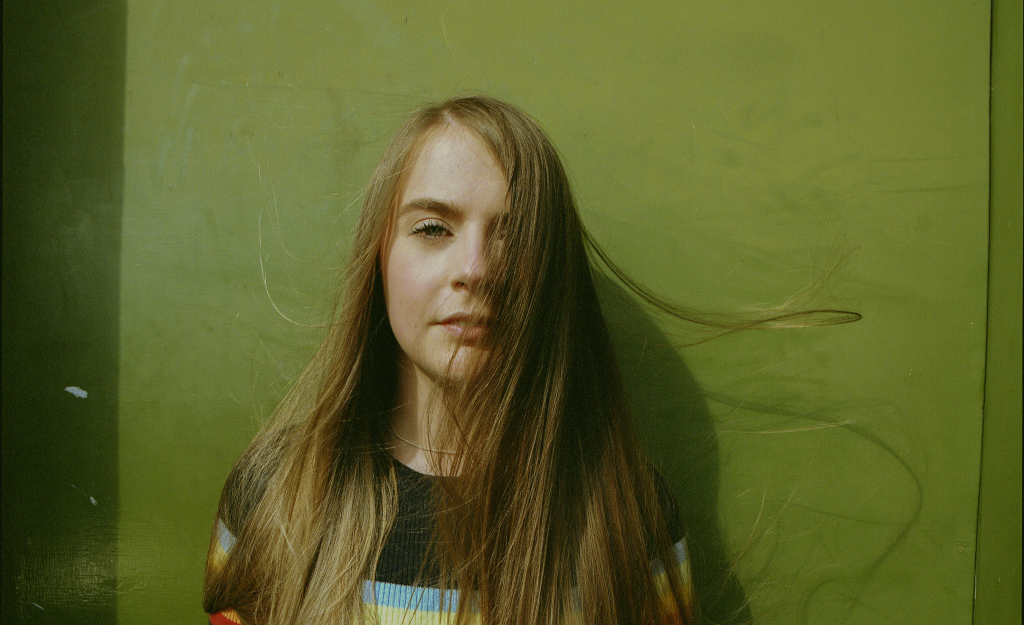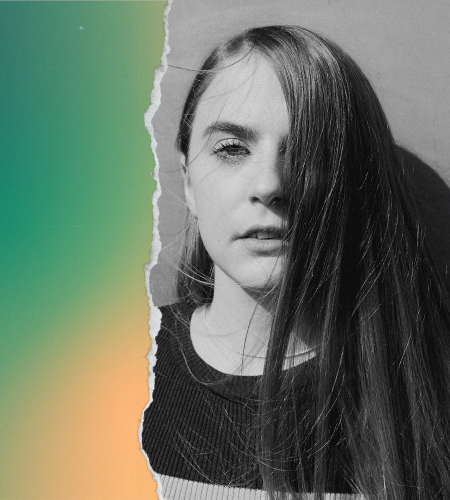
In the depths of SHEARS‘ latest EP, Now We’re Getting Somewhere, lies a narrative of introspection and growth, softly whispered through each delicate note and pulsating beat. With this collection of songs, SHEARS embarks on a deeply personal journey, exploring the intricacies of self-discovery and creative autonomy. The title thoughtfully serves as a gentle affirmation of her artistic evolution, marking a significant milestone in her pursuit of authenticity and expression.
As SHEARS navigates the labyrinth of modern existence, she confronts the pressures of constant connectivity and the quest for genuine connection. In tracks like “I Look at You (It’s Over),” she tenderly articulates the struggle to find balance amidst the cacophony of digital noise, offering a poignant reflection on the importance of reclaiming moments of solitude and introspection. Through her music, SHEARS invites listeners to embark on a shared journey of self-reflection, encouraging them to find solace in the quiet spaces of their own hearts.
Embedded within the ethereal soundscape of Now We’re Getting Somewhere is SHEARS’ signature blend of genres, delicately interwoven with heartfelt lyricism and soulful melodies. With tracks like “Figure Me Out,” she effortlessly merges gritty, fast-paced rhythms with introspective introspection, creating a harmonious balance between emotional depth and sonic innovation. Through her artistry, SHEARS not only invites listeners into her world but also sparks a conversation about gender representation and inclusion within the music industry, gently urging for greater recognition of underrepresented voices.
We caught up with SHEARS about her new EP, digital overload and genre experimentation, as well as advocating for gender diversity in music.
SheBOPS: Hey SHEARS and congrats on your recent EP release! Can you elaborate on the significance of the EP’s title, “Now We’re Getting Somewhere,” in the context of your journey as an artist?
SHEARS: This is the first body of work that I’ve fully written, recorded, produced and mixed by myself, so it really feels like now I’m getting somewhere. It feels like I’ve found my feet and hit my stride for making lots of new music, and that’s a really nice feeling.
“I Look at You (It’s Over)” addresses the pressures of constant availability online. How do you navigate this aspect of modern life personally?
I used to find it more difficult! I felt a lot of pressure to be available constantly, I’m much better now at giving myself space offline. I think it’s really important to live in the real world a little more.
What inspired the fusion of D’n’B soundscape with the lyrical content of “I Look at You (It’s Over)”?
I was listening to a lot of jungle and D’n’B, and started to experiment a little with breakbeats and different drum loops – cutting them up and arranging them. That wasn’t exactly how I made these tracks as I programmed beats for these, but I got interested in trying a new genre and seeing what I could make with these influences behind it.
Could you share some insights into the production process behind “Figure Me Out,” particularly the use of the Moog Subsequent 37?
I had lots of fun writing the bass to “Figure Me Out.” I played in using a Moog Sub 37 as audio, but also captured it simultaneously through a Blackstar amp and an SM57. I blended the two tracks together and it created a bit of a thicker sound. I also programmed some drum tracks and put them through other MIDI tracks in Ableton, creating textural beats in the background.
How do you balance the gritty, fast-paced nature of “Figure Me Out” with the rest of the EP’s overall tone?
“Figure Me Out” is probably the happiest tune on the EP. I didn’t plan the general tone of the EP before I started making it – I just decided to see what would happen. It seemed to sit nicely with the other tracks, and I was quite happy to have a song that was higher octane with lots of energy in there.
“As You Are” carries an empowering message about self-acceptance. Was there a personal experience that inspired this track?
It came from a friend telling me something about their identity that I could see was a load off their chest to say. I really appreciated them telling me, but at the same time I knew it wouldn’t change a thing.
How do you feel your sound has evolved from your previous EP, “Superhues,” to “Now We’re Getting Somewhere”?
Superhues was definitely a little poppier! I was experimenting with synths a little more in that EP, whereas in my more recent one the influence definitely came from the rhythm section. I don’t really know what I’m going to make until I make it, it sort of depends on the music I’m listening to at the time and what I’d like to try next. I’m excited to know what my next project will sound like.
What do you hope listeners take away from the EP after listening to it in its entirety?
It’s an EP full of frustrations, lost and gained friends, balance and finding happiness. I hope it’s a bit of escapism for listeners.
How do you balance the technical aspects of production with the emotional expression in your music?
I usually hear parts of songs in my head, whether that’s melodies or instrumentation in full. I’ll record ideas into my voice notes on my phone and then attempt to recreate them in Ableton. Sometimes I’ll sit with the track on a loop and see what ideas come to mind. I usually write the lyrics last now, which is a complete 180 to how I used to do things! I used to write demos with piano and vocals, but now it seems a lot more natural to let the music sit first.
What do you find most fulfilling about being an independent artist?
I love being able to make whatever music I want, whatever I’m feeling, and nobody will tell me I can’t release it. I love being able to put out music whenever I like, and make my own plans. Female producers are underrepresented in the industry, so there’s always the risk I wouldn’t be allowed to produce myself in non-independent circumstances. I like having the freedom and control to create what I like.
How do you manage the balance between experimentation and consistency in your music?
I think there’s always space for experimentation, as it allows you to evolve your practice as an artist. I usually experiment by listening to different genres and allowing their influence to creep into the next track I make. Or I might wake up and decide I want to make a dance tune! When I produce music, I’m usually not thinking about the person listening at the other side yet, which leaves a little more room for trying something new without judgment. If it works, it works! I feel like whatever I make, the music will still sound like it’s in my style of production, so it should be ok.
From your perspective, what are some specific challenges you’ve faced that you believe your male counterparts may not encounter?
One that comes to mind is how few women there are in the technical side of music. I played a show a few weeks ago, and during soundcheck I noticed that between the people working on stage, people on sound, other bands and their members, I was the only woman in the building. There were like 15 guys. It’s so common that it’s refreshing when there’s a woman behind the desk, or setting something up. It can be quite isolating to be the only woman in a space all of the time. This is also true in the recording side, when I went to studios I never got the chance to work with a woman behind the desk, and that’s partly why I initially felt intimidated. It took me a while to feel a sense of belonging in the recording space.
In what ways do you think the music industry can better support female artists and producers?
Trusting women and hiring them. The more female producers that are hired, the more women will be taken seriously in the technical side of music. It creates a safe space for female musicians, too. Also, booking women for shows, playing them on the radio, and showing support. The more role models that exist, the faster it will change for the next generation of female musicians coming up.
How do you see your music contributing to the broader conversation about gender representation in the industry?
It’s a small body of work that has been written, produced and mixed by a woman, which is not very common at all in the music industry. Hopefully it will contribute to the wider conversation about women being capable of producing and mixing, and encourage more women to get involved in the process themselves. You don’t need a man to finish your work.
What initiatives or changes do you think are necessary to address the underrepresentation of women in production roles and other aspects of the industry?
That’s a good question. I wish it were as simple as changing one or two things, but I think this goes a little deeper. Encouraging women into technical roles would be a good start, as it was something I never felt I had a place in due to my gender. I’m a member of Hen Hoose, a female and non-binary songwriting collective based in Glasgow, and my confidence has grown so much since producing and mixing for them. I’m trusted! If female musicians have the opportunity to work with female producers, mixing engineers, mastering engineers etc, then they absolutely should. I don’t think anything is going to change overnight, but small steps!
How can we better support and amplify the voices of female musicians and producers?
Hire them, book them, play them, listen to them and tell your friends about them! The longer we can stay in the industry and grow fanbases, the louder our voices can be.
What changes would you like to see in the way women are portrayed and discussed in mainstream music culture?
I’d love mainstream music culture to care slightly less about what women look like, and more about the art that they’re creating. This is an industry thing, too. I’m sure most women have had the thought that ‘they can’t make music forever’ as nobody will work with them as they age. I want to keep making music forever, I never want to put a deadline on it. I don’t want it to be about how I look, now or then, I would love to keep getting better as a producer and artist and keep creating better and better work.
Looking ahead, what are your hopes and aspirations for the future of your music career?
I want to keep creating and keep getting better as a producer and mixing engineer. I’ve been producing for others a little, and I think it’d be fun to do more of that. My songs aren’t mainstream pop, but I love writing pop! Basically I just want to create as much as possible, I’m never happier than when I write a song that I like.
Now We’re Getting Somewhere by SHEARS is out now.

